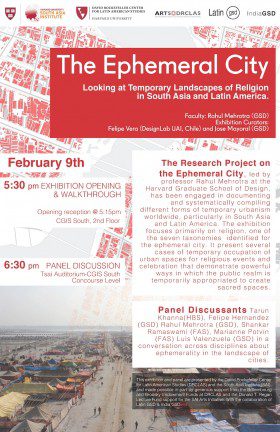Due to weather and the University closing, this event has been cancelled and will be rescheduled.
SAI Arts Initiative Event
Exhibition Reception and Personal Tour at 5:30PM in the CGIS South Second Floor Lobby, followed by a panel discussion at 6:30PM CGIS S010.
What is the role of the Ephemeral City in the broader discussion about urbanism globally? Rahul Mehrotra, Chair of the Department of Urban Planing and Design (GSD), will moderate a conversation across disciplines about ephemerality in the landscapes of South Asian and Latin American cities.
Rahul Mehrotra (GSD), in collaboration with Jose Mayoral (GSD) and Felipe Vera (Universidad Adolfo Ibañez, Chile) will guide the audience through the exhibition at 5:30 PM.
Panelists:
Felipe Hernandez, Lecturer in Urban Planning and Design, Harvard Graduate School of Design
Shankar Ramaswami, Lecturer on South Asian Studies, Director of Undergraduate Studies
Marianne Potvin, Harvard Graduate School of Design
Tarun Khanna, Director of the South Asia Institute; Jorge Paulo Lemann Professor, Harvard Business School
Luis Valenzuela, Lecturer in Urban Planning and Design, Harvard Graduate School of Design
This panel is part of the exhibition The Ephemeral City: Looking at Temporary Landscape of Religion in South Asia and Latin America.
The Research Project on the Ephemeral City, led by professor Rahul Mehrotra at the Harvard Graduate School of Design, has been engaged in documenting and systematically compiling different forms of temporary urbanism worldwide, particularly in South Asia and Latin America. This exhibition focuses primarily on religion, one of the seven taxonomies identified for the ephemeral city. It present ten cases of temporary occupation of urban spaces for religious events and celebration that demonstrate powerful ways in which the public realm is temporarily appropriated to create sacred spaces. In religious ephemeral landscapes, human ingenuity breaches the boundaries between the local and the global, the historic and the contemporary, converting permanent cities and landscapes into sacred grounds.
Cosponsored with the David Rockefeller Center for Latin American Studies (DRCLAS) at Harvard University

